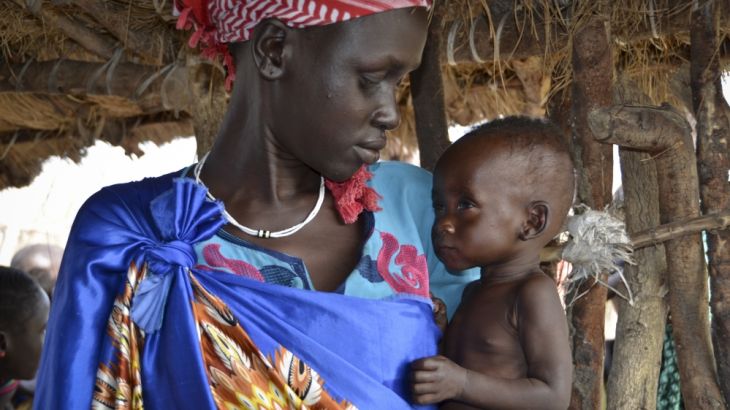The depths of despair in South Sudan
UN humanitarian official appeals for end to violence against aid workers as fighting between political rivals shows no sign of ending.

The mood of despair was evident in his words as the UN under-secretary for humanitarian affairs wrapped up a two-day visit to South Sudan.
“Ordinary people are suffering on an unimaginable scale. The peace process has so far produced nothing. The cessation of hostilities is a fiction. The economy has collapsed,” Mark Lowcock said in the capital, Juba, on Wednesday.
Keep reading
list of 4 itemsBirth, death, escape: Three women’s struggle through Sudan’s war
Mapping Israel-Lebanon cross-border attacks
Nearly 55 million face hunger in West and Central Africa, UN warns
“Belligerents use scorched-earth tactics, murder and rape as weapons of war. All these are gross violations of international law. Seven million people need humanitarian assistance in 2018. And things are simply getting worse.”
Five years of civil war in South Sudan have resulted in a humanitarian crisis affecting seven million people – that is, more than half of the country’s population – and left them in dire need of aid to survive.
Nancy Maring fled her hometown of Lainya three months ago due to fighting between government and opposition forces.
“The fighting is bad. They burn houses, they kill people,” she told Al Jazeera from Yei River state, to which she has fled for safety and aid.
“We ran away and now we are displaced.”
‘Atrocious’ situation
Yei River state was once the breadbasket of South Sudan. Nearly all who lived here farmed for a living.
|
|
But fighting in Juba in 2016 has gradually spread to the Equatoria region where Yei River state is located, displacing civilians and making it hard for them to access their farms.
More than four million people have been forced from their homes since fighting began in December 2013.
The war – which started when the country’s President Salva Kiir, implicated his former Vice President Riek Machar in a coup attempt – resulted in the deaths of tens of thousands of civilians.
More than two million South Sudanese have since settled as refugees in neighbouring countries, while the rest remained internally displaced, relying on aid to survive.
“The situation in humanitarian terms, across the whole of South Sudan, is terrible. It’s atrocious,” Lowcock told Al Jazeera in Mundu, situated in a part of Yei River state that is controlled by Machar’s forces.
“It’s getting worse and worse as time passes and the reason is the war. The men with guns have brought the people of this country to their knees and it needs to stop.”
‘Peace’ talks
Hopes are now pinned on a fresh round of talks to revive a peace agreement – reached between Kiir and Machar in 2015 – that are due to start on Thursday in Addis Ababa, the capital of Ethiopia.
But this is the third round of talks. The first round ended with a ceasefire agreement that was violated less than 24 hours after it was signed.
The second round ended in a stalemate as opposition groups demanded that Kiir step down or give them more powerful positions.
“Millions of people have been displaced, so they don’t have access to educational services, health services and so on,” Lowcock told Al Jazeera.
“The displaced people are themselves facing atrocious levels of sexual exploitation and abuses, murders and killings.”
As the political rivals try to talk and settle their disputes thousands of miles away in Addis Ababa, South Sudanese in the country continue to suffer from the consequences of the war.
“I have a farm but they are killing us and now I am afraid of going back,” Wani Nicholas told Al Jazeera in Mundu.
Despite the large number of people dependent on aid in South Sudan, delivering relief supplies is not easy.
Aid workers targeted
Since the fighting began, at least 100 aid workers have been killed and humanitarian personnel have had to be withdrawn more than a dozen times, leading to a halt in operations in many areas.
A majority of the incidents involving aid workers since the beginning of this year have occurred in areas controlled by the opposition.
Last month, 10 aid workers were abducted by opposition forces in Yei, although Brigadier-General Lemi says it is not their policy to target humanitarian agencies.
“We have criminals, those are no longer part of the opposition. If they commit any crime, they lay the blame on us,” he told Al Jazeera.
“Since the ceasefire, we haven’t attacked and we have no problems. If aid agencies want to come, they can come. We won’t attack or block them.”
Yet aid workers have not only been blocked but also abducted and killed, three of them in this year alone.
The government in Yei River state has pledged unhindered access to aid workers and appealed to the opposition to follow suit.
“The security situation in Yei is calm,” Yusto Mama, a senior government official, told Al Jazeera.
“We are calling for peace, we are calling for reconciliation and we are calling on our brothers to calm down and join the government because we do not encourage war.”
The men with guns have brought the people of this country to their knees and it needs to stop.
There are also concerns about donor fatigue setting in, with the war in its fifth year.
The UN says it will need $1.7bn to address the humanitarian challenges in South Sudan but only 21 percent of that amount has been covered.
“For the humanitarian community, one of the big problems of South Sudan is that we too are subjected to violence,” the UN’s Lowcock told Al Jazeera.
“This is one of the worst places to be an aid worker. What we need is an end to the violence against aid workers and unfettered and unhindered access.”